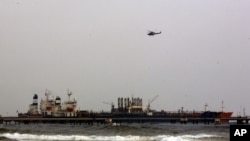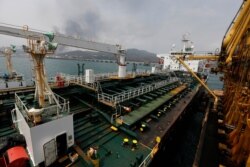Last May, Iran’s President Hassan Rouhani threatened that there would be a proportionate response to any U.S. attempt to block shipments of Iranian oil to Venezuela.
“We will act in reciprocation,” he said.
The Middle Eastern country so far, however, has remained evasive about the U.S. seizure of more than 1 million barrels of Iranian gasoline aboard four Greek-owned vessels headed for Venezuela last week, making observers speculate that Tehran is not interested in further escalation with Washington.
The U.S. Justice Department in a statement Friday called the cargo “the largest U.S. seizure of Iranian fuel.” It said the fuel cargo was confiscated “with the assistance of foreign partners,” adding that no military force was used in the operation.
Evasive approach
While officials in Tehran first denied the cargo had anything to do with them, they now admit it did originate from Iran, but they contend it had already been sold to Venezuela when seized by the U.S. This claim has not yet been confirmed by Caracas.
“If [the Iranians] admitted that this was their fuel on these Greek-owned ships, then they had to do something as a response,” Alex Vatanka, an Iran expert with the Washington-based Middle East Institute, told VOA by phone. “They didn’t want to do that because responding to that U.S. action would have escalated the situation and they clearly don’t want to escalate.”
Even if Iran’s claim that the fuel ownership had been transferred to Venezuela is correct, the U.S. confiscation of the tankers could discourage the Venezuelan government from further trading with Iran, dealing new blows to both countries’ fragile economies, experts say.
US presidential elections
Barbara Slavin, director of the Future of Iran Initiative at the Atlantic Council, said Tehran appears to be pursuing a wait-and-see foreign policy vis-à-vis Washington ahead of the U.S. presidential elections, hoping that President Donald Trump will lose to his Democratic Party rival, Joe Biden, in November.
“I don’t know if Iran has been paid or not,” Slavin told VOA by email, “but it’s pretty clear that it doesn’t want to escalate the situation before U.S. elections — and especially before the U.S. goes to the Security Council regarding snapback [sanctions].”
Snapback is a provision in the multiparty Iran nuclear deal that any “participant state” can trigger to reimpose the United Nations’ sanctions on Iran. U.S. Secretary of State Mike Pompeo formally notified the U.N. Thursday that the U.S. was initiating the snapback of sanctions. Europeans say Washington no longer has the right to do that since it withdrew from the deal in 2017.
Washington said it is resorting to snapback because members of the U.N. Security Council have refused to extend an arms embargo on Iran beyond its October 15 deadline.
Unlikely bedfellows
The recently strengthened relationship between Iran and Venezuela, experts say, is an example of how sanctions can make for unlikely bedfellows. Iran is a right-wing Islamic Republic, while Venezuela is a left-wing communist state.
“The two sanctioned states have moved forward to bolster the ties,” said Yousof Azizi, a research assistant at Virginia Polytechnic Institute and State University, adding that while oil-rich Venezuela needs gasoline because of its lack of refineries, Iran needs Venezuelan gold to shore up its weakened currency.
Venezuela reportedly has paid in gold for fuel from Iran.
Benjamin Friedman, a policy director at the Defense Priorities organization in Washington, has a more cynical view of Washington’s sanctions toward Caracas.
“Neither the recent history of U.S. foreign policy nor Venezuela in particular give any ground to believe that the sort of economic pressure the U.S. is inflicting on Venezuela will encourage regime change,” he told VOA by email.
“The resulting deprivation, in fact, seems to create more support for sanctioned governments, by making people more dependent on them, and by creating a nationalistic backlash against the sanctioning state that heightens the popularity of hardline governments,” he added.
The U.S defends its maximum-pressure campaign against Iran and accuses the country of engaging in destabilizing activities in the region by propping up proxies in various countries.





